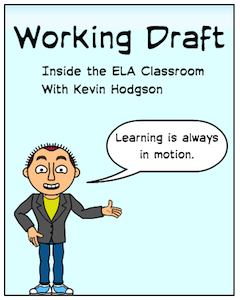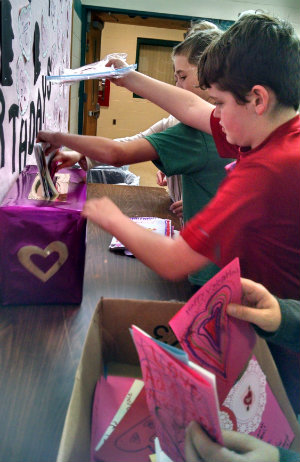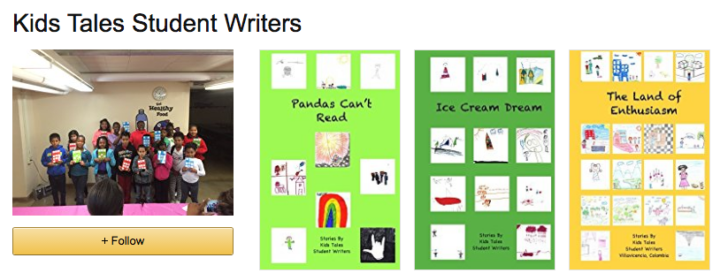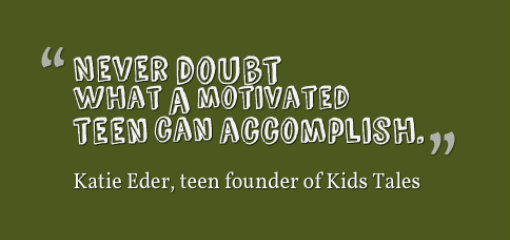Every Student is a Potential Change Agent
A MiddleWeb Blog

For an entire week, each morning, they were working on a growing collection of cards for military veterans at the nearby Soldier’s Home.
It’s a huge building nor far from us, overlooking the highway – a place where elderly military veterans go when they sometimes have nowhere else to go.
This Valentines for Veterans project was the brainchild of our sixth grade-run Student Council, which I assist in its work (along with our school’s assistant principal).

All of us were focused on finding a way to make the lives of these veterans who served our country, and who often feel forgotten by the world outside the facility, to be remembered and to be thanked, in the art and words of young people. Such a simple project. But one with ripples of compassion, and one that shows a commitment to the larger world outside the school walls.
Caring kids who want to help others
The other day, I was thinking about the Valentines for Veterans project and the role of the Student Council in our school community as I hosted a hangout session for National Writing Project’s Educator Innovator. Our guest was 16-year-old Katie Eder, who founded an organization called Kids Tales as an eighth grader.
Three years later, Kids Tales (“Changing the World One Story at a Time”) has expanded to reach hundreds of young writers (8 to 12) by tapping into the desire of dozens of teenagers who want to make change in the world.
Katie was joined in the hangout by two other teenagers – Shreya Reddy and Morgan Kerfeld – from the Kids Tales network. You can check out our chat here:
As I was guiding the online conversation, I was struck again and again by the vision of these teenagers to bring free writing opportunities to disadvantaged neighborhoods and to guide young writers through the entire process, ending with self-publication of books of stories on the Amazon site.
These young leaders are dedicated, engaged, and looking ahead to a larger vision of their work with a multi-year plan to continue expanding the outreach efforts.
Katie was an eighth grader when she first pursued her idea to provide more writing opportunities to kids who might not otherwise have the opportunity, for whatever reason. Look where it has taken her. Shreya, Morgan and many others (nearly 100 teen volunteers and growing) were looking for ways to improve the world and decided Kids Tales was the place to become change agents.
The kids are the leaders
What’s even more interesting: there is almost no adult presence in the Kids Tales organization. It’s all teenagers and young adults. Teens are on the Board of Directors. Teens design the curriculum. Teens help teens expand Kids Tales to more and more places (including overseas).
The teens also pitch ideas to grant organizations and venture capitalists. Teens are following their dreams of making the world a better place, and they are making it happen themselves. They are working in inner cities, in youth detention centers, even in a refugee camp in Hungary, to bring writing opportunities and connections to young writers.
How do we encourage that same mindset in our own students? How do we help them see their own potential and their own roles as agents of change?
They have to want it
One way I have tried to spark this kind of kid leadership is with our Student Council.
Interestingly, as the adult connected with the Student Council over the years, I have intentionally waited each fall to form the group until a student or students pester me about it.
It’s a strategic decision. I want them to be invested in the work of the Student Council. They have to want it to happen. This year, the pester didn’t take long to make itself known.
Within the first two weeks of school, I had one of my students eagerly asking me about the formation of the Student Council, and she kept following up with me as I delayed to let the new school year settle into place. We started the Student Council in late fall, and the list of projects that the group came up with was incredible and rich with possibilities.

They plan school spirit events as a way to bring the entire school community together, and they plan targeted projects to reach out beyond the school walls. They are thinking not of themselves. They’re thinking of others. Of the world.
I see my role as one of the adults with our Student Council like this: We facilitate ways to bring their youthful visions of change to a reality, even within the many constraints of the school day and school structure.
I gladly give up my prep/planning time, and our vice principal sets aside time in his busy week, to do this work because we want our students, just like Katie and her colleagues, to pursue the possibilities of a better world, and to not just sit back and hope that a better world appears.
I want them to be the ones to help make the world a better place for all of us. And I am confident they can do it, too.



































Thanks for informing us about Kid Tales. I’m a retired principal now, but one of the best parts of being a principal and assistant principal was running student councils. I looked forward to the meetings, and the kids’ ideas and follow-through on projects. We had used book sales, Valentine gram sales, door decorating contests, all highly organized by the kids, with a little help. Every school should have a Student Council.